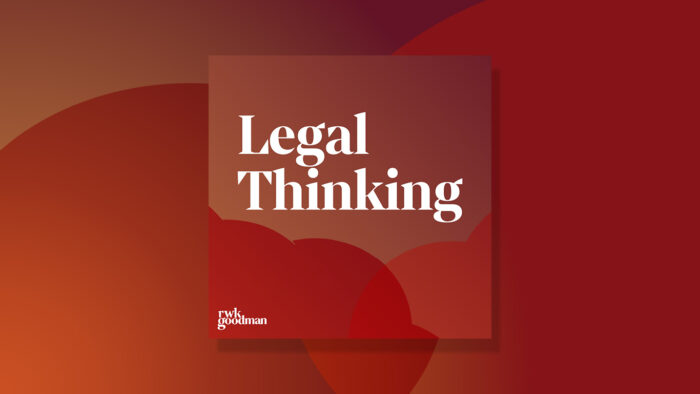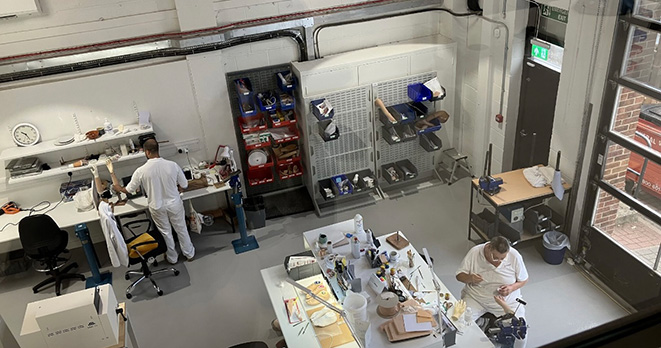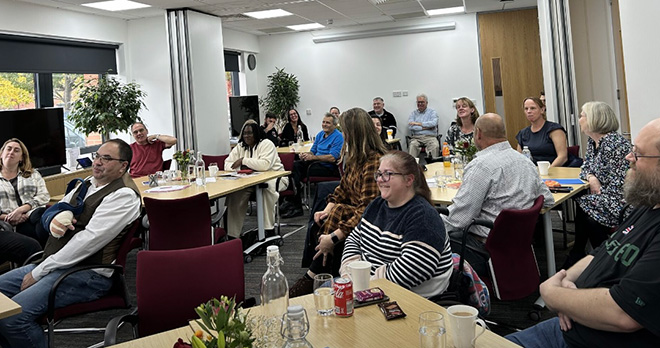Speaking with Dr Hannah Bashforth about the psychological impact of birth trauma.
This podcast transcript has been edited in places for readability. You can also listen to our podcast on your podcast platform of choice - find it here >
In this epsiode Hannah Blackwell, Senior Associate in our expert maternal birth injury team, interviews Dr Hannah Bashforth about the psychological impact of birth trauma.
So Dr Bashforth, thank you so much for joining us on this podcast. So my first question. Childbirth is often viewed as a positive event and, while for many it is, for those who experience birth trauma, it can be an extremely difficult time. Do we need to better understand the vulnerability of mothers, birthing people and families at this time to ensure they are protected as much as possible?
Absolutely. Thank you for inviting me today to speak with you about such an important topic.
The thing about childbirth is it’s a bit of a paradox, really. It has the possibility of becoming one of the most, hopefully not, traumatic experiences of somebody’s life but is viewed very much by society as a joyful, positive event. So one of the most obvious, unique factors around psychological distress and trauma that can manifest following childbirth is that often we associate the development of post-traumatic stress symptoms and post-traumatic stress disorder with very negative events or obviously physically traumatic events. And for that reason, as health professionals and as a wider society, we need to think, in my view, a lot more broadly about creating spaces where birthing people can ensure psychological safety as much as physical safety.
We talk a lot about appropriate medical safety around giving birth, but actually there are a lot of psychological risk factors associated with giving birth for mothers. Some of the other aspects that make the development of trauma, psychological trauma, unique within childbirth is often around the fact that giving birth is a very sensory experience. Women are hearing lots of noises, hospital noises – they’re experiencing perhaps lots of sensory feedback in their bodies that they’re not used to experiencing, particularly if they are first time mothers and they haven’t given birth before, a context often of overwhelming pain and feeling out of control – and what this can mean in terms of psychological symptoms that might manifest subsequently in terms of post-traumatic stress, is that symptoms of re-experiencing or flashbacks can often have more of a sensory quality to them perhaps than other incidents that might lead to post-traumatic stress disorder.
And just another area that’s particularly important to note is that, obviously, once an individual’s given birth, once a mother’s given birth, she has a young child to look after, assuming all is well following the birth, and so that mother/infant bond can often be something that’s not considered but is really important, particularly if the mother is struggling with her own mental health, the impact that that can then have on that bonding relationships. So I guess really what we’re saying there is that some of the unique aspects are around the ripple effect that psychological trauma can have after a mother has given birth, which perhaps has a unique quality compared with other situations where PTSD or post-traumatic stress symptoms may develop.
Yeah. Certainly clients I speak to who have suffered birth trauma often describe feeling particularly impacted by negative language that was perhaps used at the time. Is this an area that you've come across or that's been researched, and is it something the people that you work with have raised?
Absolutely. The language that we use in medical context is hugely important and I say that across all medical specialities really.
You know, my area of interest is around psychological medicine, but, particularly during childbirth, the language, and not just the choice of words that health professionals use, but the tone in which it’s delivered, the manner in which it’s delivered, the context is hugely important. Often, difficult narratives or difficult things are said to women when they’re in high levels of pain, they’re very confused, they’re perhaps feeling very out of control of a situation and it’s very difficult, as we all know, to kind of process complicated information or think about what’s happening when we feel distracted by lots of sensory information.
So language is hugely important, but particularly when we think about how perhaps some of the ways in which post-traumatic stress symptoms can manifest is that these perhaps quotes or narratives that are given to women whilst they’re in labour can then unfortunately become quite sticky in the postnatal period. So things like, “You’ve failed to progress”.
You know, often what I can hear from mothers that I work with is that they feel a sense of failure and that language does have connotations of there’s something that your body hasn’t done that has allowed the situation to move forward, and obviously in treatment sometimes it can be about really honing in on that language and thinking about the emotional impact of that but also perhaps the more extreme examples are when women are given messages such as, “If you don’t push now, your baby’s in real danger”, or, “There could be real catastrophic consequences here. You need to do this”, and actually a large part of kind of understanding the psychological impact of the experience of giving birth is really about drilling down into some of these words and messages, medical messages, that were given during the birthing process to allow a mother to unpack, reflect and perhaps reframe things in a way that feels more psychologically comfortable and less distressing. So, in answer to your question, it’s incredibly important and we need to work harder.
Yeah. Just one thing that occurs to me listening to you speak there, when you're talking about because it's such a sort of sensory experience that we're put in, is there ...I know when I had my daughter I could go and look around the hospital beforehand and stuff. Is there things that we mothers could be doing or also doctors and midwives could support mothers in doing in trying to prepare for that sort of sensory change. Would that ...is that something that might help at all?
Yeah, I think being aware and doing obviously things like hypnobirthing and breathing techniques and those sorts of things allow us just more generally to build a good and positive relationship between the mind and the body and feeling connected with ourselves and sometimes work with women in the lead up to giving birth if perhaps there’s quite a lot of antenatal anxiety about that. That is something that we would encourage, which is to actually become comfortable to listen to your body’s messages, to recognise when your body is in distress or it needs something and to be able to respond.
I guess it’s a fine balance, isn’t it? Because one of the things that can potentially be predictive of emotional upset subsequent to birth is when things don’t go as planned and women feel out of control and so there is a fine balance to walk between kind of what we might describe as kind of overpreparing or feeling like things have to go in a certain way because that can then paradoxically set mothers up for feeling like, “I didn’t do it like I should have done or how I should have prepared”.
I think what’s really tricky is that, you certainly don’t need me to state this, the NHS being under such high demand and under-resourced and maternity services really being very stretched with midwifery care and provision that all of these things – in a utopian society, we would say ‘oh of course it’s ideal for a woman to go ahead and visit the unit and have a look around, meet the staff’. Continuity.
You cannot underestimate the value of continuity of care because the psychological safety that is created when we go into a situation where we’re feeling trepidation, particularly if it’s the first time attempting to have a child, to see a familiar face, to have, “This person’s been with me for the last 38 weeks. They know my body”, but there are so many factors that unfortunately mothers aren’t in control of because they’re system level factors and that makes it really challenging to necessarily optimise preparation in advance.
So there are some things we can do at an individual level but I think ultimately, if you were to press me, I would say a lot of these things need to come top down, the system level changes that need to accommodate women more rather than the other way around, but, of course, that’s my view.
That makes sense as well certainly from people that I've spoken to. What advice would you give to people who may be worried about a family member who has suffered from a traumatic birth? Are there certain signs of a trauma response that people should be alert to?
Yeah, it’s a great question and the thing about post-traumatic stress symptoms, and in it’s kind of full blown character PTSD, is that there are hallmark symptoms that can manifest, but they can manifest differently in lots of different individuals depending on the experiences that they’ve had, depending on premorbid factors that were relevant to them before they had a child and throughout the pregnancy.
So for some mothers it may be that a partner notices that they’ve become very, very withdrawn and distant and actually seem to be quite emotionally unresponsive, perhaps not crying, perhaps being quite sort of nonchalant about things, ambivalent, not really taking much pleasure from things. So you wouldn’t necessarily expect to see someone waking in the night with flashbacks or articulating that distress, although that can be one way in which it manifests.
So I guess in terms of looking out for signs as a partner, it’s important to recognise that any changes may be related to the fact that you’ve just had this new baby land in your life and that brings about lots of changes anyway to a new mother’s kind of emotional state and we can always expect emotional ups and downs in that immediate postnatal period and so sometimes these things are nothing to worry about and they’re part of that transition into parenthood and so it’s important also not to kind of what we might say kind of psychopathologise every emotional response, but I think being alert and being attuned to quite stark changes, withdrawal, numbing and absence of emotion can often be quite a concerning sign as opposed to very overt signs.
But of course anyone that’s worried shouldn’t hesitate really to speak with the community midwife or go to their GP and not necessarily wait for that six-week check.
Yeah and sometimes I think there can be a fear about starting to talk about something that you found traumatic. How successful are therapies for birth trauma?
Yeah. I mean, the point you made just there at the beginning is actually a really important one and links back to your first question about the unique qualities of sort of psychological trauma in childbirth, in that it can be really difficult for mothers to come forward to say, “I had a really hard time giving birth and I found it really traumatic and I’m struggling to bond, I’m struggling to feel happy in the aftermath”, even though potentially things might have been medically straightforward, or they may also feel, “I should be grateful, the medics did everything they could. There was a medical emergency, but everyone’s well and okay”.
So I think speaking to your first point, it’s important to say that there can be a difficulty in feeling like there’s a justification to come forward and ask for help in the first instance and that can often lead then to potentially a delay in the assessment and then a delay in the commencement of any appropriate psychological support and treatment.
What we know is that the most kind of researched therapies for post-traumatic stress after childbirth are trauma-focused cognitive behaviour therapy and EMDR – Eye Movement Desensitisation Reprocessing Therapy – a bit of a mouthful, and these therapies essentially have been shown in the research to be effective but obviously each individual will be more or less receptive to those types of approaches depending on how amenable they are, if you like, to talking about their emotions or wanting to participate in that type of approach and it can be really difficult to find the practical time and space in the immediate aftermath of having given birth to actually engage in treatment and feel you’ve got that headspace to focus on yourself really.
So in some ways that can affect the efficacy of the timing, or it isn’t right and the individual who’s kind of struggling feels perhaps like it’s really difficult, “I’m exhausted. I’ve just given birth. I’m still recovering physically. The last thing I want to do is go and sit in a room and talk to someone about one of the worst experiences of my life”. So they are effective, but they need to be delivered by the right people and at the right time and, equally, even if individuals are struggling, they shouldn’t necessarily feel pressured that they’ve got to go and do it immediately. It needs to be obviously timed around kind of feeling physically ready to do it as well as kind of practically having the space.
Yeah and one of the recommendations from the birth trauma inquiry report is the commissioning of research on the economic impact of birth trauma and injuries, including factors such as women having to delay their return to work. From your experience of the families that you've worked with, do you think that perhaps the impact of birth trauma goes wider than most of us are able to appreciate?
Yeah, I think when we think about psychological issues, we often kind of just root it in the individual, don’t we? But actually there are wide reaching effects from all mental health difficulties and conditions.
We know that actually, aside from PTSD, depression can have a significant impact upon somebody’s ability to maintain work or return to work. So we know, again we go back to that ripple effect of birth trauma that it can have on the family unit as a whole, perhaps even the capacity of the partner to go back to work because they’re having to be at home to do more childcare because the mother’s perhaps not feeling emotionally well enough or is struggling themselves.
We know as well that potentially, if there are issues around bonding, that it might be difficult for a mother to feel okay with starting childcare provision for example, because there might be some anxiety there and that might be an additional cost because you’re not able to kind of go back to work so you’re not able to then pay for childcare.
So you get stuck in this loop where then you’re kind of at home and you’re not sure how to move forward. So there are lots of wider ramifications to an individual suffering due to what’s happened to them giving birth in terms of working capacity, ability to function in the household, ability to socialise and ability to feel like they can be themselves and get back to being kind of a productive member of society.
Yeah, that's certainly what I see from my clients as well. It's much wider reaching than you might expect and the effect on the family is much more profound as well and certainly I've got a lot of clients that haven't been able to go back to their previous employment and that's been a big change then for the whole family sort of financially and just in terms of day-to-day sort of lifestyle for them.
Absolutely and I think one of the things that I see often and hear often in women, actually it’s possibly particularly more prominent in those who have unfortunately maybe experienced a stillbirth or a pregnancy loss, is that actually going back to the working environment that you were in whilst you were pregnant if you then experienced a trauma or a loss, can be very, very emotionally triggering.
So I often speak to women who potentially do want to go back to some form of work but feel unable to go back to the work that they were in because perhaps that in and of itself has got that emotionally traumatising, triggering quality to it, if you like, and one of the other aspects as well that I often see is the delaying of future pregnancies due to the anxiety and fear that that might instil about having to go through it again really.
So there are wider impacts in respect to kind of perhaps how a family unit saw themselves progressing through the years. That might be either sped up or slowed down and then the implications of that as well.
Yeah and in that scenario I suppose there's a constant grieving going on isn't there for the child that isn't with you at that point?
Absolutely. Absolutely. Yeah and the difficulty kind of in the context of a stillbirth, for example, and the trauma associated with that potentially is that often what we see, and what I see kind of anecdotally and in my clinical work, is that a lot of mothers feel a desperate desire to become pregnant again, a yearning to, but then when that happens that can then start off a whole catalogue of other emotional responses, even after perhaps they have a successful birth and they have a healthy child, that then can be a reminder of the child at every anniversary. So these psychological consequences can be quite far reaching over a number of years from the actual event that’s taken place, if you like.
Yeah and, finally, how do you think trauma affects a new mum's ability to choose how they seek redress?
Yeah, I think this goes back to the very sort of original point about how as a society we perceive giving birth as a positive event and the pressure that families may feel to, say, be grateful for what they’ve received and the NHS are under pressure and everything was okay in the end and actually there is a sense of kind of being almost kind of silenced by that societal view that, “Well, you’ve got a healthy child now anyway” potentially, if the child had eventually been been born healthy and well, but also the experience of kind of numbness and withdrawal that can come with traumatic stress means that there can often be a self-silencing in terms of a lack of kind of confidence or a lack of sort of value in how you might have perceived it, doubt if you like.
I often see women looking back at their experience of giving birth and thinking very clearly, “It must have been me. It must have been me that did something wrong there because these people know what they’re doing and they did their best and so it must be something that’s my body did at the time” and one of the biggest ones is a sense of, “I’m concerned about seeking redress because what if it uncovers something that proves that it was my fault?” As well it identifies a point in the chronology, a point in the narrative, when mum should have put her hand up and said this isn’t right or there was a beep over there or this should have happened and that can be incredibly anxiety-provoking and can cause people to kind of withdraw and not want to kind of get into it.
Yeah. I see that as well and I think there’s a tendency sometimes for clients that I see to think, to look to blame themselves initially, I don’t know if that’s quite a maternal sort of response but also then and perhaps tied in with that is a fear that they’re not going to be believed, what they think happened when no one will believe them. Clients express that a lot to me.
Yeah. I think that’s a really valid point and it speaks to the system level difficulties around where power lies and it’s the same as in all kind of medical provisions, not just kind of obstetrics, but a sense of, “Well, I can’t fight the system” or, “The system can’t be wrong” and actually, “It’s all of that big system against just us. Just me and my husband or me and my partner and there’s no way that they’re going to believe what we say because it’ll be in their records and they’ll change the records anyway”.
So you often see these kind of things, and I think there’s a definite issue there around power imbalance in terms of how people can feel that they can get that redress, particularly for those who perhaps themselves have had very limited contact with healthcare provision up until the point they required maternity services, and actually you’re dealing then with liaising with people who are health professionals that go there every single day as part of their work. So of course they must know. So it’s kind of understandable that people have that self-doubt.
Yeah and I certainly see it and I have a lot of people that come to me and also there’s the three year limitation period for looking at a medical negligence case and I do find that in the area of work that I do that a lot of women are coming to me very close to that three year period or sometimes outside of it because they just haven’t been able to deal with the trauma that they’ve been going through, or they’ve blamed themselves or thought that someone wouldn’t believe them and I think, going back to what you were saying at the start, it’s such an important time in someone’s life, isn’t it, having a baby and all of these sort of sensory overwhelm of being in that sort of vulnerable position and all of these changes that are happening at that point. It does …I think we can sometimes underestimate how long it takes for somebody to then with all these complex feelings to process that and look for redress, what happened to them and why?
Absolutely. I completely agree with that. I think it can’t be underestimated.
I mean, any new parent knows the sheer physical toll that it takes when you transition into parenthood, the sleep deprivation, the change in routine. I mean, that in itself takes a period of time, irrespective of potentially anything that needs to be addressed in the actual birthing process. So by the time you’ve sort of acclimatised and especially if you’re a new parent, it’s quite common I think for people to think, “This is just me not coping, and actually I should have got over it by now and I’ll give it another six months and I’m sure I’ll feel better in another month or so”, or, “I’m sure it’s because I’m just tired”.
So we kind of get into that process don’t we of kind of self-gaslighting if you like in a way and I see clinically, I will see women who don’t necessarily start to really acknowledge or connect with symptoms of post-traumatic stress until they become pregnant with a second child because it almost like unlocks things and the feelings whereas actually what they’ve done is sort of push through, “I need to be there for my child. I need to focus on the bonding. I need to do the right thing”. You know, perhaps if they’re breastfeeding, that potentially is a real focus and there’s a lot of emotional and cognitive avoidant opportunities when we’ve got a new child to not engage with those thoughts, but they’re there and our amygdala is kind of ringing away and very stressed out in our brain but we’ve got these kind of massive overt distractions, haven’t we, that would give us good reason to be not really focusing on it.
Make sure to check out our guide for mums who’ve experienced an injury at birth.

Subscribe to Legal Thinking
Want to hear more from our podcast?
Find out where you can subscribe and check our our back catalogue right here on our website.
More insights from our maternal birth injury team
View more articles related to Maternal injury and Team Around the Client






